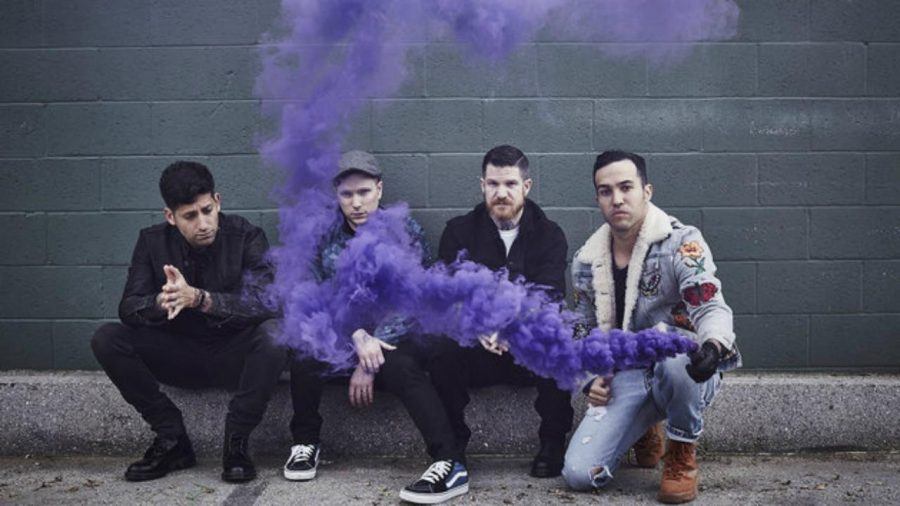No longer crusading to save rock and roll, Fall Out Boy has absconded with the genres of emo, punk, and pop to redefine itself through a turbulent decade.
Long gone is the guyliner, the heavy guitar, the riptide of incomprehensibly paced lyrics — but Fall Out Boy is determined to stick around. It’s a group that’s known many faces, initially rising into popularity with the 2000s trend of the mainstream emo band, a genre with a penchant for hitting that sweet spot where middle school angst intersects with that other sixth-grade need for dance-worthy jams. However, Fall Out Boy wasted no time jumping off of that sinking ship as the genre faded into obscurity in the 2010s and bands either went their separate ways or leaned more heavily into the “pop” side of emo pop.
Fall Out Boy, for its part, learned to thrive in the pop punk genre. “Folie à Deux” was its last true emo album, and “Save Rock and Roll” was a surprising comeback after a four-year-long hiatus, debuting its iconic “My Songs Know What You Did In the Dark.” While some of the band’s old fans felt disillusioned by the transition, it was a change that worked for the band. Its next album, “American Beauty/American Psycho,” cruised to number one in charts, and was later remixed into the collaborative “Make America Psycho Again.”
But Fall Out Boy’s sustainability is once more called into question as its latest album, “MANIA,” creeps closer to the label of straight-up pop than ever before. Saving rock and roll is a quest Fall Out Boy seems to have abandoned in “MANIA” — its claim on the rock genre itself feels shakier than ever with its distinctive lack of once-overpowering guitars and its new reliance on electronic tuning — but it still stays in line with the essence of much of the band’s later work. At this point, accusing Fall Out Boy of “selling out” would be beating a dead horse. The question is: With how much grace have the members managed to do so?
“MANIA” is the band’s shortest album to date, running at 45 minutes, and is pop-ier than ever. There’s a heavy electronic reworking of the vocals, as evident from even the first song, “Young and Menace,” a track with a mechanical Midas’ touch that turns each moment into something electric. The sound feels comparable to electronic dance music, which proved so unpopular with fans after the initial release of “Young and Menace” as a single that the band pushed back the album’s release date to rewrite it completely. While the members managed to cool it a bit with the computer-engineered audio, the sound is still distinctively different than their earlier work, though still prone to the same bouts of Patrick Stump’s vocals trailing into higher and higher pitches (though now with the assistance of some liberally applied autotune).
This isn’t necessarily indicative of the entire album, however. “Champion,” the album’s other single release, easily could have been a track off of “American Beauty/American Psycho” or “Save Rock and Roll.” It’s a pretty clear piggyback off of the popularity that “Centuries” gifted them, an anthem of self-celebration and determination that repeatedly declares, “If I can live through this, I can do anything.” It misses the mark just a bit, not quite managing the same kind of assertive appeal that “Centuries” inspired, but the spot near the mark it occupies is enjoyable nonetheless.
The album’s lyrics mix with furious electronic beats and, true to Fall Out Boy form, pull you in with their intensity without being particularly inspired. “Stay Frosty Royal Milk Tea” is weirdly fun with its fast-paced energy and snappy witticisms such as “about to go Tonya Harding on the whole world’s knee,” despite its lyrics making about as much sense put together as the words in its title do. The faster, peppy rhythms of “HOLD ME TIGHT OR DON’T” are indistinguishable from anything Top 40, but they do play on the band’s past emo rep in “Wilson (Expensive Mistakes),” a guitar-heavy and electronics-light song that declares, “I’ll stop wearing black when they make a darker color.”
“Church” is the definite stand-out track of the album, fusing the best of the band’s new and old styles to create a sort of high drama. Church bells and choral chants are layered with electronic beats and Stump’s intense repetition of the lyric, “If you were church, I’d get on my knees.” As the song comes to a head, the guitar riffs become increasingly dispersed as the choir continues its refrain in the background before moving into the soulful “Heaven’s Gate,” which, aside from some drum-heavy moments, could have come off a Bruno Mars album. It’s a definite cooldown after the previous piece, and appropriately paired with religious themes.
So what is this? Has Fall Out Boy found the golden ratio between rock and pop, or is it at risk of treading the line between the two so closely as to succeed at neither? While fans of Fall Out Boy’s earlier work may consider this latest album a bigger departure than ever, Fall Out Boy’s more recently acquired pop-punk fans can still find themselves at home among these new — albeit jarringly electronic — songs. It’s not quite the same, but hell, it’s still pretty good.
Image Courtesy of Island Recors








